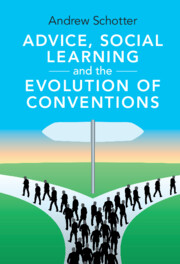Book contents
- Frontmatter
- Dedication
- Brief Contents
- Contents
- Figures
- Tables
- Preface
- 1 Introduction
- Part I Background
- Part II Coordination, Distribution, and Trust Conventions
- Part III The Impact of Public Advice and Common Knowledge
- Part IV The Value of Advice
- Part V Advice and Economic Mechanisms
- 12 Chatting and Matching
- 13 School Matching and Learning under the Influence of Intergenerational Advice
- 14 Conclusions
- Index
12 - Chatting and Matching
from Part V - Advice and Economic Mechanisms
Published online by Cambridge University Press: 09 March 2023
- Frontmatter
- Dedication
- Brief Contents
- Contents
- Figures
- Tables
- Preface
- 1 Introduction
- Part I Background
- Part II Coordination, Distribution, and Trust Conventions
- Part III The Impact of Public Advice and Common Knowledge
- Part IV The Value of Advice
- Part V Advice and Economic Mechanisms
- 12 Chatting and Matching
- 13 School Matching and Learning under the Influence of Intergenerational Advice
- 14 Conclusions
- Index
Summary
In recent years there has been a great deal of interest in designing matching mechanisms that can be used to match public school students to schools (the student matching problem). The premise of this chapter is that, when testing mechanisms, we must do so in the environment in which they are used in the real world rather than in the environment envisioned by theory. More precisely, in theory, the school matching problem is a static one-shot game played by parents of children seeking places in a finite number of schools and played non-cooperatively without any form of communication or commitment between parents. However, in the real world, the school choice program is played out in a different manner. Typically, parents choose their strategies after consulting with other parents in their social networks and exchanging advice on both the quality of schools and the proper way they should play the “school matching game”. The question we ask here is whether chat between parents affects the strategies they choose, and if so, whether it does so in a welfare-increasing or welfare-decreasing manner. We find that advice received by chatting has proven to have a very powerful influence on decision makers, in the sense that advice tends not only to be followed but typically has a welfare-increasing consequence.
Information
- Type
- Chapter
- Information
- Advice, Social Learning and the Evolution of Conventions , pp. 321 - 359Publisher: Cambridge University PressPrint publication year: 2023
